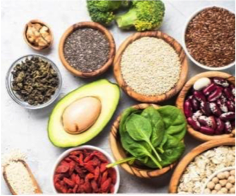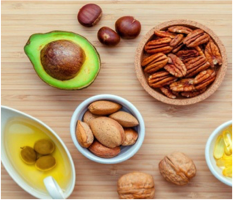Nutritional Facts
A diabetes diet simply means eating the healthiest foods in moderate amounts and sticking to regular mealtimes. Managing blood sugar is the key to living well with diabetes, and eating healthy foods in the right amounts at the right times is the key to manage blood sugar.
A diabetes diet is a healthy-eating plan that's naturally rich in nutrients and low in fat and calories. Key elements are fruits, vegetables and whole grains. The plan helps you control your blood sugar, manage your weight and control heart disease risk factors such as high blood pressure and high blood fats. You can help keep your blood glucose level in a safe range by making healthy food choices and tracking your eating habits.
A registered dietitian can help you put together a diet based on your health goals, tastes and lifestyle. He or she can also talk with you about how to improve your eating habits, such as choosing portion sizes that suit the needs for your size and activity level.
Recommended foods-
Healthy carbohydrates: During digestion, sugars (simple carbohydrates) and starches (complex carbohydrates) break down into blood glucose.
- Focus on healthy carbohydrates: Fruits, vegetables, whole grains, legumes such as beans and peas, and low-fat dairy products such as milk and cheese
- Avoid less healthy carbohydrates such as foods or drinks with added fats, sugars and sodium
-

-

-
Fiber-rich foods: Dietary fiber includes all parts of plant foods that your body can't digest or absorb. Fiber moderates how your body digests and helps control blood sugar levels.
- Vegetables, fruits, nuts, legumes such as beans and peas, whole grains
- Heart-healthy fish; eat heart-healthy fish at least twice a week(salmon, mackerel, tuna and sardines)
-
'Good' fats: Foods containing monounsaturated and polyunsaturated fats can help lower your cholesterol levels.
- Avocados, nuts, canola, olive and peanut oils
Don't overdo it, as all fats are high in calories.
-

Foods to avoid
Diabetes increases your risk of heart disease and stroke by accelerating the development of clogged and hardened arteries.
-
-
Saturated fats: Avoid high-fat dairy products and animal proteins such as butter, beef, hot dogs, sausage and bacon. Also limit coconut and palm kernel oils.
-
Trans fats:Avoid trans fats found in processed snacks andbaked goods
-
Cholesterol: Cholesterol sources include high-fat dairy products and high-fat animal proteins, egg yolks, liver, and other organ meats. Aim for no more than 200 mg of cholesterol a day
-
Sodium:Aim for less than 2300 mg of sodium a day. Your doctor may suggest you aim for even less if you have high blood pressure
-
-

References:
- Available from: https://www.niddk.nih.gov/health-information/diabetes/overview/diet-eating-physical-activity. Accessed on November 11, 2021.
- Available from: https://www.beatmysugar.com/blog/a-traditional-south-indian-diet-plan-for-type-2-diabetes. Accessed on November 11, 2021.